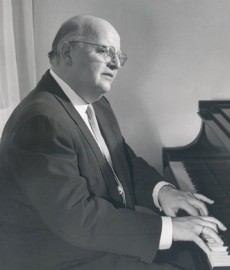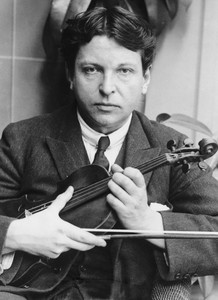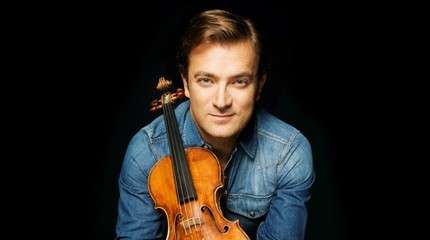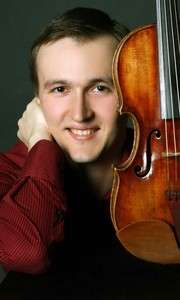
Josef Krips |
Joseph Krips

“I was born in Vienna, I grew up there, and I am always attracted to this city, in which the musical heart of the world beats for me,” says Josef Krips. And these words not only explain the facts of his biography, they serve as the key to the artistic image of an outstanding musician. Krips has the right to say: “Everywhere I perform, they see me first of all as a Viennese conductor, personifying Viennese music making. And this is especially appreciated and loved everywhere.”
Listeners of almost all countries of Europe and America, those who at least once came into contact with his juicy, cheerful, charming art, know Krips as such a true crown, intoxicated with music, enthusiastic and captivating the audience. Krips is first of all a musician and only then a conductor. Expressiveness is always more important for him than accuracy, impulse is higher than strict logic. No wonder he owns the following definition: “Pedantically and correctly marked by the conductor of a quarter measure means the death of all music.”
The Austrian musicologist A. Viteshnik gives the following portrait of the conductor: “Josef Krips is a sanguine conductor who ruthlessly devotes himself entirely to music-making. This is a bunch of energy, which constantly and with all passion plays music with all its being; who approaches the work without affectation or mannerisms, but impulsively, decisively, with gripping drama. Not prone to lengthy reflections, not burdened by stylistic problems, not bothered by the smallest details or nuances, but constantly striving for the whole, he sets in motion exceptional musical emotions. Not a console star, not a conductor for the audience. Any “tailcoat coquetry” is alien to him. He will never correct his facial expressions or his gestures in front of a mirror. The musical process is so clearly reflected on his face that all thoughts of conventions are excluded. Selflessly, with violent force, ardent, broad and sweeping gestures, with an irresistible temperament, he leads the orchestra through the works he is experiencing by his own example. Not an artist and not a musical anatomist, but an arch-musician who infects with his inspiration. When he raises his baton, any distance between him and the composer disappears. Krips does not rise above the score – he penetrates into its depths. He sings with singers, he plays music with musicians, and yet he has complete control over the performance.”
The fate of Krips as a conductor is far from being as cloudless as his art. Her beginning was happy – as a boy he showed musical talent early, from the age of six he began to study music, from ten he sang in the church choir, at fourteen he was excellent at playing the violin, viola, and piano. Then he studied at the Vienna Academy of Music under the guidance of such teachers as E. Mandishevsky and F. Weingartner; after working for two years as a violinist in an orchestra, he became choirmaster of the Vienna State Opera and at the age of nineteen stood at its console to conduct Verdi’s Un ballo in maschera.
Krips was rapidly moving to the heights of fame: he headed the opera houses in Dortmund and Karlsruhe and already in 1933 became the first conductor at the Vienna State Opera and received a class at his alma mater, the Academy of Music. But at that moment, Austria was occupied by the Nazis, and the progressive-minded musician was forced to resign from his post. He moved to Belgrade, but soon the hand of Hitlerism overtook him here. Krips was forbidden to conduct. For seven long years he worked first as a clerk and then as a storekeeper. It seemed that everything was over with conducting. But Krips did not forget his vocation, and the Viennese did not forget their beloved musician.
On April 10, 1945, Soviet troops liberated Vienna. Before the volleys of war had died down on Austrian soil, Krips was again at the conductor’s stand. On May 1, he conducts the solemn performance of The Marriage of Figaro at the Volksoper, under his direction the Musikverein concerts are resumed on September 16, the Vienna State Opera begins its work on October 6 with the performance of Fidelio, and on October 14 the concert season opens at the Vienna Philharmonic! During these years, Krips is called “the good angel of Viennese musical life”.
Soon Josef Krips visited Moscow and Leningrad. Several of his concerts featured works by Beethoven and Tchaikovsky, Bruckner and Shostakovich, Schubert and Khachaturian, Wagner and Mozart; the artist devoted the whole evening to the performance of Strauss waltzes. Success in Moscow marked the beginning of Crips’ worldwide fame. He was invited to perform in the USA. But when the artist flew over the ocean, he was detained by immigration authorities and placed on the notorious Ellis Island. Two days later, he was offered to return to Europe: they did not want to give an entry visa to the famous artist, who had recently visited the USSR. In protest against the non-intervention of the Austrian government, Krips did not return to Vienna, but remained in England. For some time he led the London Symphony Orchestra. Later, the conductor nevertheless got the opportunity to perform in the USA, where he was warmly received by the public. In recent years, Krips has led orchestras in Buffalo and San Francisco. The conductor regularly toured Europe, constantly conducting concerts and opera performances in Vienna.
Krips is rightfully considered one of the world’s best interpreters of Mozart. His performances in Vienna of the operas Don Giovanni, The Abduction from the Seraglio, The Marriage of Figaro, and his recordings of Mozart’s operas and symphonies convince us of the justice of this opinion. No less significant place in his repertoire was occupied by Bruckner, a number of symphonies of which he performed for the first time outside of Austria. But at the same time, his repertoire is very wide and covered various eras and styles – from Bach to contemporary composers.
L. Grigoriev, J. Platek, 1969





